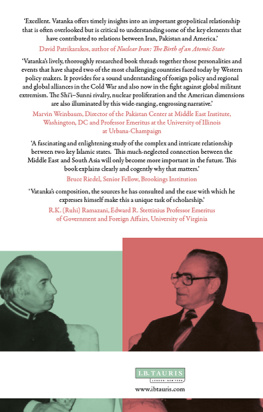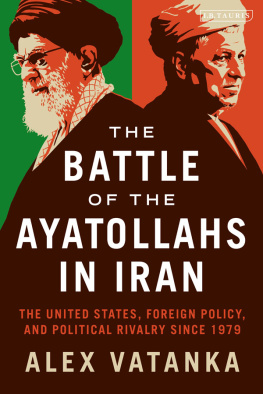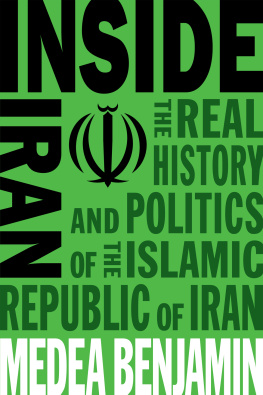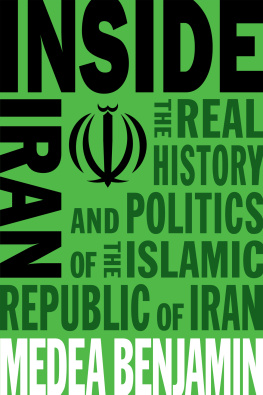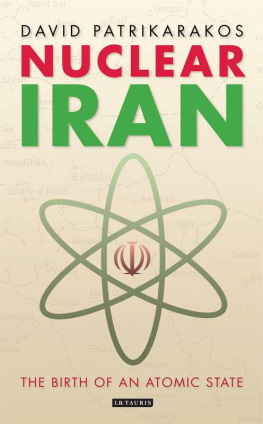
Alex Vatanka is Senior Fellow at the Middle East Institute and Jamestown Foundation in Washington, DC. A specialist in Middle Eastern geopolitics with a focus on Iran, he was previously the Senior Middle East Analyst at Janes defence and security group in London.
Excellent. Vatanka offers timely insights into an important geopolitical relationship that is often overlooked but is critical to understanding some of the key elements that have contributed to relations between Iran, Pakistan and America.
David Patrikarakos, author of Nuclear Iran:
The Birth of an Atomic State, I.B.Tauris, 2012
In tracing the course of IranianPakistani taut relations over nearly seven decades, Vatankas lively, thoroughly researched book threads together those personalities and events that have shaped two of the most challenging countries faced today by Western policy makers. The book provides for a sound understanding of areas of foreign policy and regional and global alliances that once figured so prominently in the Cold War and also now in the fight against global militant extremism. The ShiiSunni rivalry, regional nuclear proliferation and the American dimension are also illuminated by this books wide-ranging, engrossing narrative.
Marvin Weinbaum, Director of the Pakistan Center at Middle
East Institute, Washington, DC and Professor Emeritus
at the University of Illinois at Urbana-Champaign
A fascinating and enlightening study of the complex and intricate relationship between two key Islamic states, Iran and Pakistan. This much neglected connection between the Middle East and South Asia will only become more important in the future. This book explains clearly and cogently why that matters.
Bruce Riedel, Senior Fellow, Brookings Institution
This book is an ultimate supreme example of all the works so far done on the subject. Vatankas composition, the sources he has consulted and the ease with which he expresses himself make this a unique task of scholarship.
R.K. (Ruhi) Ramazani, Edward R. Stettinius Professor Emeritus
of Government and Foreign Affairs, University of Virginia
IRAN AND
PAKISTAN
Security, Diplomacy and American Influence
A LEX V ATANKA

Published in 2015 by
I.B.Tauris & Co. Ltd
London New York
www.ibtauris.com
Copyright 2015 Alex Vatanka
The right of Alex Vatanka to be identified as the author of this work has been asserted by the author in accordance with the Copyright, Designs and Patents Act 1988.
All rights reserved. Except for brief quotations in a review, this book, or any part thereof, may not be reproduced, stored in or introduced into a retrieval system, or transmitted, in any form or by any means, electronic, mechanical, photocopying, recording or otherwise, without the prior written permission of the publisher.
Every attempt has been made to gain permission for the use of the images in this book. Any omissions will be rectified in future editions.
References to websites were correct at the time of writing.
International Library of Iranian Studies 57
ISBN: 978 1 78453 214 7
eISBN: 978 0 85773 915 5
A full CIP record for this book is available from the British Library
A full CIP record is available from the Library of Congress
Library of Congress Catalog Card Number: available
To Heidi, Martin, Kathrin and my parents
CONTENTS
ACKNOWLEDGEMENTS
In Islamabad, I asked a group of retired Pakistani diplomats about access to the archives at the Foreign Ministry. Dont bother inquiring, one of them replied. I took that to mean that the archives were simply off-limits to outsiders. But he continued. What you will find about Pakistani policy deliberations [toward Iran] in the archives in Washington or London are probably more complete than what you will find here, the former Pakistani ambassador insisted.
As implausible as it sounded at that particular moment, with time and after combing through declassified American and British documents relating to IranianPakistani affairs dating back to the late 1940s, I came to appreciate the sentiment the Pakistani diplomat was conveying. The Iranians and the Pakistanis each have, of course, separate accounts of events relating to seven decades of state-to-state relations. That was not the point.
The point is that IranianPakistani ties, in moments of cooperation or rivalry, have over the years been hugely shaped by their respective attitudes and interests vis--vis the Western world. And among Western powers, the Americans and the British have beyond question been the most influential players in this part of the world.
It is in American and British archives one finds important clues or even the missing details that can better explain the actions of Tehran and Islamabad toward each other over the years. The United States in particular has since the mid-1960s been the third and undeniable column in IranianPakistani relations. And where Washington opts to stand on relations between these two countries will continue to be crucial as IranianPakistani relations move forward.
Research projects on political history in Iran and Pakistan, as is the case in most of west Asia, are invariably sensitive. Official archives are mostly not available to unsanctioned outsiders. Personal interviews and memoirs, when possible and available, are therefore critical sources. Accordingly, this book project benefitted greatly from the time and insights of many individuals.
Ardeshir Zahedi was most gracious in hosting me in Montreux. His many years of working with the Pakistanis as foreign minister and as a close confidant of the Shah of Iran made him an invaluable authority. In Washington, Assad Homayoun, a former senior Iranian diplomat from the Shahs era, was most helpful in his suggestions given his postings both in Islamabad and later in Washington.
In Rawalpindi, Islamabad and Lahore, Asad Durrani, Shamshad Ahmad, Talat Masood, Khalid Mahmood, Taqi Bagash, Arif Ayub, Rasul Baksh Rais, Javid Hussain, Massarrat Abid and Asma Khawaja were able to open my eyes, and many doors, to leave me deeply appreciative of the making of Pakistani foreign policy. Thanks also to the Institute of Strategic Studies (Islamabad) for generously hosting me.
In Kabul, Haji Mangal, Davood Moradian and Vahid Mojdeh, gave me important first-hand accounts from the days of Soviet occupation and Taliban rule. Combined they provided me with a strong understanding of the nature of IranianPakistani rivalry on Afghan soil. Thanks also to Shahir Ahmad Zahine, Melek Zahine and Rahim Khan for making my stay in Kabul a fruitful and wonderfully memorable one.
Among Iranians with government experience in the Islamic Republic, Abol-hassan Bani-Sadr, Hossein Mousavian, Abbas Maleki and Ali-Akbar Omid-Mehr deserve my special thanks for the time they took out to speak with me on the various aspects of Irans foreign policy toward Pakistan and Afghanistan in the post-1979 era.
Among former American officials with a wealth of experience in the region, I am particularly indebted to Michael Metrinko, James Dobbins, Bruce Riedel, Zalmay Khalilzad, Charlie Naas and Jim Placke. Vali R. Nasr, F. Gregory Gause III, Ahmad Kamal, Arif Jamal, Toby Dalton, Yousaf Butt, Ann Wilkens, Vinay Chawla, Rahimullah Yusefzai, Shah Jahan, Ahmad Etmad and David Mack each helped me along the way. Meanwhile, the staff at the offices of the American Institute of Pakistan Studies (AIPS) in Islamabad, the Foundation for Iranian Studies in Maryland and the Library of Congress in Washington were always supportive. At the Jamestown Foundation, I depended faithfully on its president, Glen Howard, and senior fellow Michael Ryan to guide me during the various aspects of writing this book. I stand grateful to them both.
Next page
